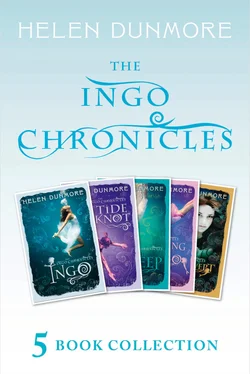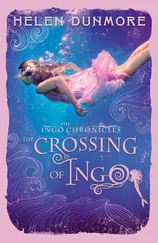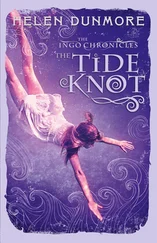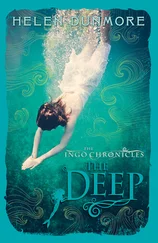“No, he wasn’t married, but he had a girl,” says Granny Carne. “He was in love with Annie, before the mermaid called to him. She was carrying Mathew’s baby when he disappeared. Annie gave the baby Mathew’s name, even though he’d left her and people were saying he’d betrayed her. It’s that little baby Mathew who carried the Mer blood down and gave you the inheritance.
“Poor Annie, how she loved Mathew Trewhella,” goes on Granny Carne, as if she can see it all before her, clear and real as the honey cake on the table in front of us. “She would have fought the Zennor mermaid tooth and nail, and won Mathew back, if they’d met as equals. But she wasn’t just fighting the Zennor mermaid. She was fighting the old Mer blood in Mathew, that wanted to be away in Ingo.”
I stare at Granny Carne. The way she talks about all these long-ago people makes me shiver.
“So you’re saying that the story’s true? That Annie’s baby is our ancestor?” asks Conor.
“Of course he is. How could it be otherwise?” asks Granny Carne harshly. “No more now. No more. I’m tired.”
She looks tired. Not strong and tall any more, but empty and grey, as if the colour of life has poured out of her. She huddles back in her chair, shuts her eyes and takes a few deep breaths, then with her eyes still closed, she says in a low monotone that is almost like a chant: “But you’ve got a choice too. No inheritance can force you to accept it. You are the ones who choose. Salt water or sweet water.”
“But we need to know— ” I’m burning with impatience. Granny Carne has got to tell us more. Away in Ingo – why did she use those exact words?
“Granny Carne, you’ve got to tell us more—”
“Got to? Got to , my girl?” Granny Carne’s eyes flash amber. She fixes me with a gaze so stern that I flush red and drop my eyes. Her eyes blaze amber, like an owl’s eyes when it sees its prey. “Never throw a gift back to the giver, don’t you know that? Cut the cake now. Conor, open the damper on my stove. That kettle’s slow to boil.”
And we know she won’t say one more word about Mathew Trewhella or the mermaid or Ingo or any of it. I pick up the knife to cut the cake, and the scent of honey and ginger makes my mouth water.
Granny Carne won’t talk, but she can’t stop me thinking. The olden-days Mathew Trewhella, the one in the story, he never came home. Is that what he really wanted? Or did he decide in a split second to follow the mermaid, without realising that he could swim down that stream with her, but he’d never be able to swim back up it again? How did he feel when he knew there was no going back, ever?
How hard it must be to make such a choice. You’d be pulled from both sides, until you felt you were going to be torn apart. Choose Annie, or choose the Zennor mermaid. Choose home and family, or the love he wanted to follow. Maybe it was Annie who slashed the wooden belly of the carved mermaid. Maybe she hated her that much.
Have I got to choose too? The question beats in my head like the sound the waves make when they rush up on to the sand, and drain away. Swash and backwash, that’s what it’s called. Dad told me. He said, Isn’t it wonderful to think, Saph, that all the time we’re alive those waves are beating on the shore, just as our hearts are beating in our bodies. It never stops. And when our hearts stop beating, the waves will still be coming in and out, the same as ever, until the world ends .
“I think you’ve cut enough of that cake now,” says Granny Carne. I look down in surprise at the slices lapping over the white plate, beautifully neat and even. I didn’t realise I’d cut so many. The honey cake is sticky and golden, studded with pieces of crystallised ginger. Granny Carne makes tea, and we all sit round the table. Conor and I talk to Granny Carne about Sadie, and how Jack’s mum had said we could have her a year ago, and Jack didn’t mind because they already had Poppy and Jasper. But Mum thought it would make too much work, with her having to get a job in St Pirans.
“But it’s you that really wants Sadie, Saph,” Conor says, to my surprise.
“You do too.”
“Not as much as you. I like her, but she’d be your dog, if she came.”
“Would you mind?”
“No. It’d be good. I wouldn’t have to worry about you when you were at home on your own.”
“I wouldn’t ever be on my own, if I had Sadie.”
Granny Carne says nothing much, just fills cups and plates. Later she tells us about a bull terrier with one eye that she had once, years ago, and how she’s never had a dog since he died, because she didn’t want to replace him. I wonder how many centuries ago that was ? I think.
“What’s so funny, Saph?”
“Nothing. Granny Carne, can I have a bit more cake?”
Conor has three slices, and I have two. It’s one of the best cakes I’ve ever tasted, moist and light and meltingly sweet. My stomach is warm and full and I feel drowsy. I could sit here for hours, chatting over tea. You could almost believe that Granny Carne is just like any other old lady who lives alone and remembers you when you were a baby, and knows everything about everyone in the village, and keeps a delicious cake ready in a tin, in case someone comes.
A bee knocks against the window, buzzing. Granny Carne goes to the window, opens it a crack and tells the bee to go away, she’ll be up later. The bee flies off at once, up into the blue, as if it understands.
“They like to know what’s going on,” Granny Carne explains. “You always have to tell the bees. If there’s a birth or a death, you tell them before you give the news to anyone else, and then they’re satisfied.”
Yes, you could almost believe that Granny Carne is just like any other old lady who lives alone. But not quite.
“Could I visit the bees?” asks Conor abruptly. I stare at him in surprise.
“You want to talk to my bees?” says Granny Carne.
“Yes. If that’s OK.”
Granny Carne gets up, and stands tall as a queen, considering Conor. She says nothing more, but after a long moment she turns and walks out of the cottage door.
“I think she’s angry,” I say nervously. “I wish you hadn’t asked. They’re her bees.”
“She’s not angry,” says Conor calmly. “She’ll be back in a minute.”
He’s right. Granny Carne comes back in with her beekeeping clothes over her arm.
“I keep them out in the shed,” she says. “Bees don’t like the smell of houses. Now then, Conor.”
She hands him a pair of baggy white trousers and a beekeeper’s smock. Conor pulls them on over his jeans and T-shirt.
“My boots will be too small for you, but you’ll be all right with your trainers. Tuck the trousers in so the bees can’t crawl on to your skin. They don’t want to sting, since it’s death to them, but if they find themselves trapped in your clothes they’ll panic. Now the hat.”
Conor puts on the beekeeper’s hat and veil. Granny Carne adjusts it, and stands back to check he is completely protected.
“You’ll do.”
We walk in single file up a little path on to the highest part of the Downs. Granny Carne first, then Conor, then me. The sun blazes on us. The buttery, coconut scent of gorse fills the air, and sparrows flit out of the bushes as we go by. We tread heavily, to warn any snakes there may be. It’s the kind of day an adder would come out to bask on a stone.
The ground dips, and there in a protected hollow ahead of us is a beehive. Even from this distance I can see a smoky blur of bees going in and out, and hear the low hum of their busyness.
“We won’t go any closer, Sapphire,” says Granny Carne, “and you keep nice and still now, and talk soft.”
Читать дальше












